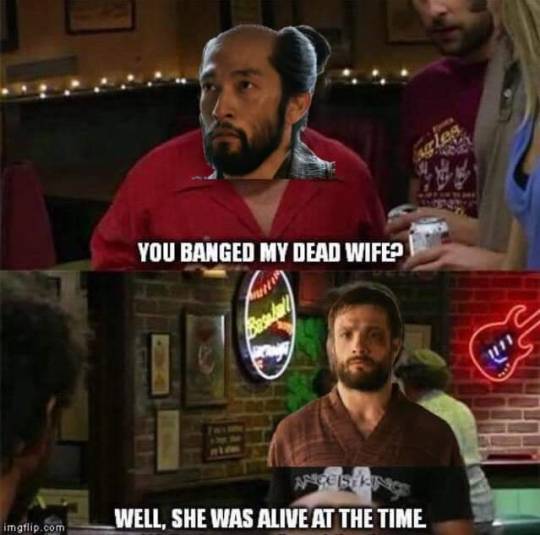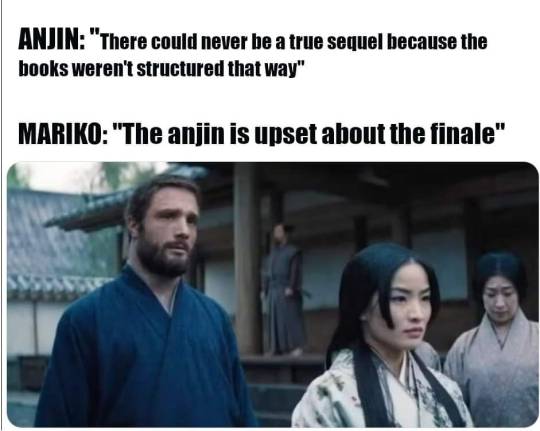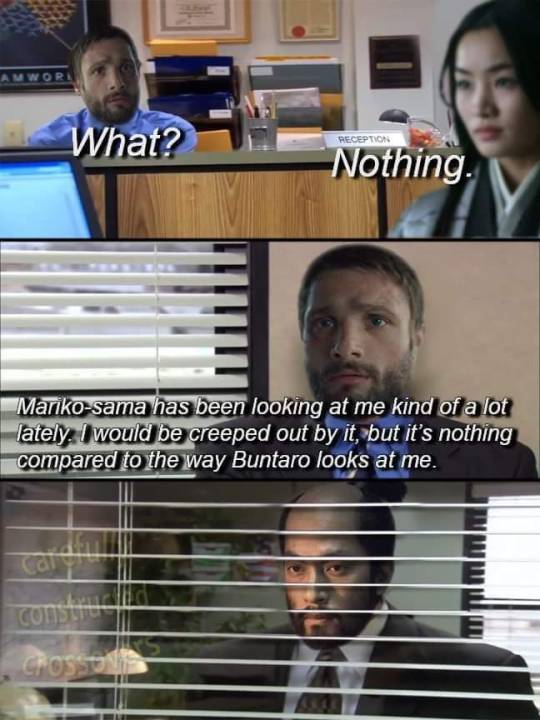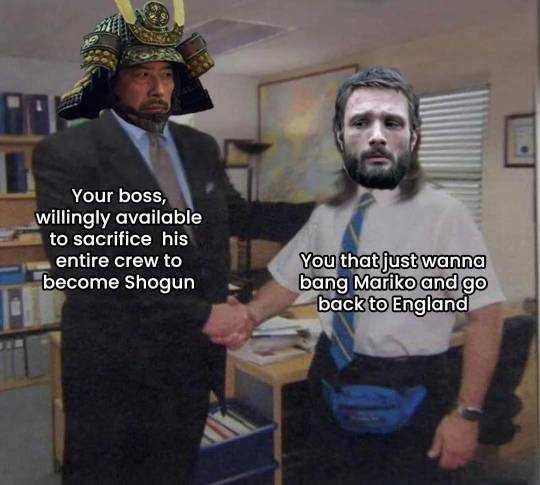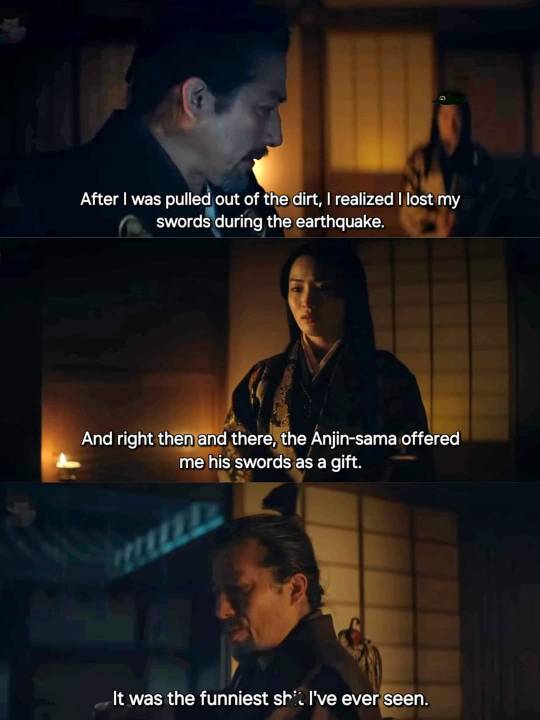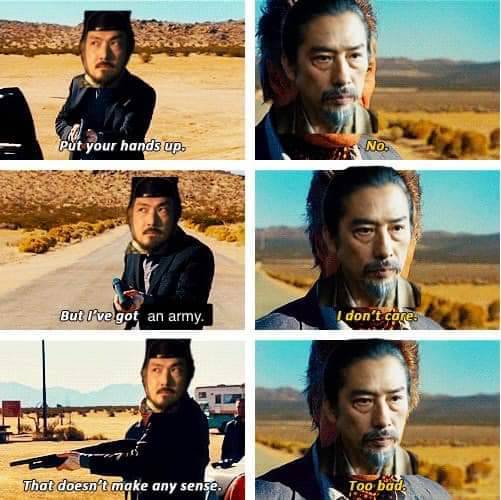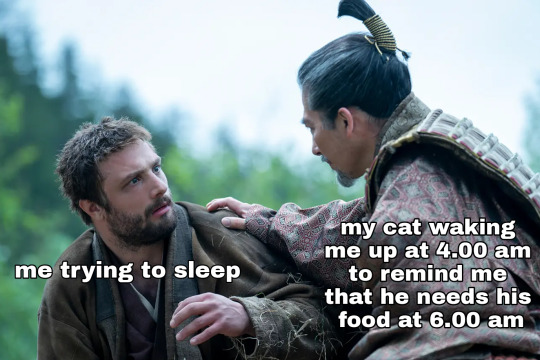Text

I mean, someone with dark hair and eyes might not consider themselves the same exact flavour of white as let's say a typical germanic person. My family gets regularly mistaken for Greeks and our Slavic asses haven't left Moravia at least since the 1700s.
So, there is this chart:
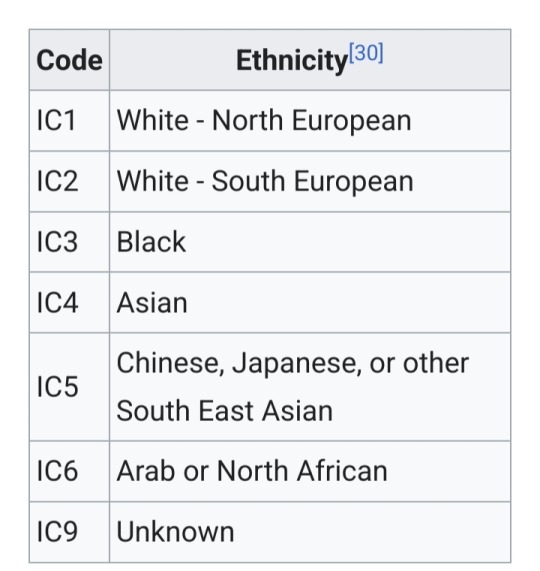
No other options,everyone else will wait until tomorrow.
6 notes
·
View notes
Text
Tenhle?

Prosím vás, sousedé, nemáte někdo ve spíži ten obrázek Dannyho DeVita se zbraní a s textem "Vodprejskni, čůzo"? Potřebuju ho do pečení.
32 notes
·
View notes
Text
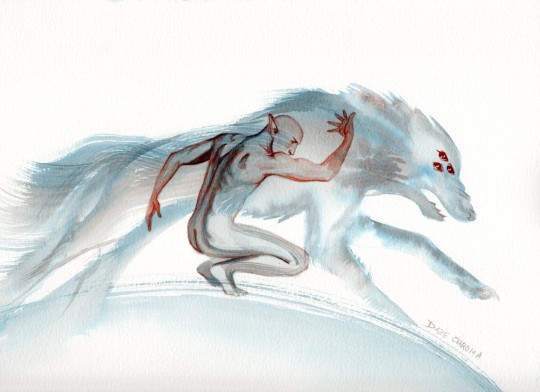
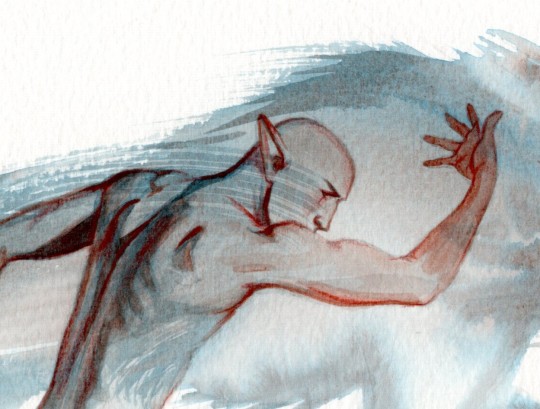
On the hunt-
-made of dreams and nightmares,
the dreadwolf
Ink and colored pencil on paper
204 notes
·
View notes
Text
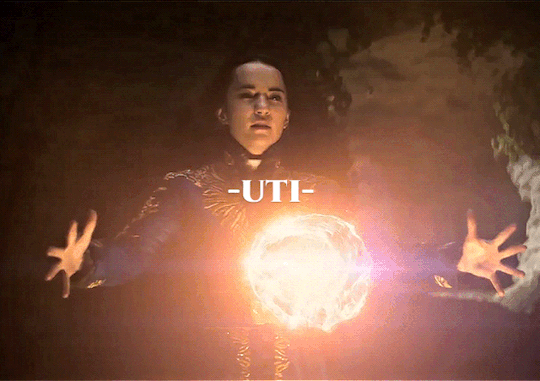
I just saw a gifset that split the word "beautiful" into 3 gifs and I think this one may be the new t hanos
249K notes
·
View notes
Text
Shōgun Historical Shallow-Dive: the Final Part - The Samurai Were Assholes, When 'Accuracy' Isn't Accurate, Beautiful Art, and Where to From Here
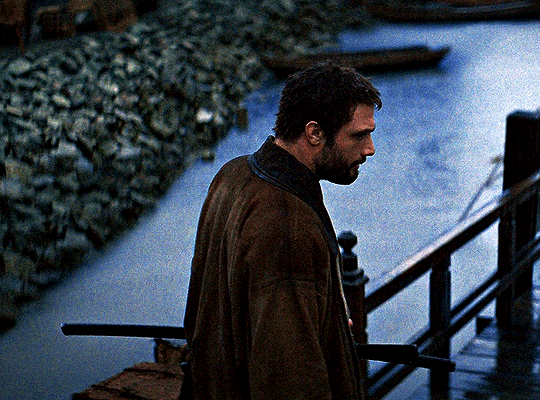
Final part. There is an enormous cancer attached to the samurai mythos and James Clavell's orientalism that I need to address. Well, I want to, anyway. In acknowledging how great the 2024 adaptation of Shōgun is, it's important to engage with the fact that it's fiction, and that much of its marketed authenticity is fake. That doesn't take away from it being an excellent work of fiction, but it is a very important distinction to me.
If you want to engage with the cool 'honourable men with swords' trope without thinking any deeper, navigate away now. Beyond here, there are monsters - literal and figurative. If you're interested in how different forms of media are used to manufacture consent and shape national identity, please bear with me.
I think the makers of 2024's Shōgun have done a fantastic job. But there is one underlying problem they never fully wrestled with. It's one that Hiroyuki Sanada, the leading man and face of the production team, is enthusiastically supportive of. And with the recent announcement of Season 2, it's likely to return. You may disagree, but to me, ignoring this dishonours the millions of people who were killed or brutalised by either the samurai class, or people in the 20th century inspired by a constructed idea of them.
Why are we drawn to the samurai?
A pretty badly sourced, but wildly popular history podcast contends that 'The Japanese are just like everybody else, only more so.' I saw a post on here that tried to make the assertion that the show's John Blackthorne would have been exposed to as much violence as he saw in Japan, and wouldn't have found it abnormal.
This is incorrect. Obviously 16th and 17th century Europe were violent places, but they contained violence familiar to Europeans through their cultural lens. Why am I confidently asserting this? We have hundreds of letters, journals and reports from Spaniards, Portuguese, Dutch and English expressing absolute horror about what they encountered. Testing swords on peasants was becoming so common that it would eventually become the law of the land. Crucifixion was enacted as a punishment for Christians - first by the Taiko, then by the Tokugawa shogunate - for irony's sake.
Before the end of the feudal period, battles would end with the taking of heads for washing and display. Depending on who was viewing them, this was either to honour them, or to gloat: 'I'm alive, you're dead.' These things were ritualised to the point of being codified when real-life Toranaga took control. Seppuku started as a cultural meme and ended up being the enforced punishment for any minor mistake for the 260 years the ruling samurai class acted as the nation's bureaucracy. It got more and more ritualised and flowery the more it got divorced from its origin: men being ordered by other men to kill themselves during a period of chaotic warfare. I've read accounts of samurai 'warriors' during the Edo period committing seppuku for being late for work. Not life-and-death warrior work - after Sekigahara, they were just book-keepers. They had desk jobs.
Since Europe's contact with Japan, the samurai myth has fascinated and appalled in equal measure. As time has gone on, the fascination has gone up and the horror has been dialled down. This is not an accident. This isn't just a change in the rest of the world's perception of the samurai. This is the result of approximately 120 years of Japanese government policies. Successive governments - nationalist, military authoritarian, and post-war democratic - began to lionize the samurai as the perfect warrior ideal, and sanitize the history of their origin and their heydey (the period Shōgun covers). It erases the fact that almost all of the fighting of the glorious samurai Sengoku Jidai was done by peasant ashigaru (levies), who had no choice.
It is important to never forget why this was done initially: to form an imagined-historical ideal of a fighting culture. An imagined fighting culture that Japanese invasion forces could emulate to take colonies and subdue foreign populations in WWI, and, much more brutally, in WWII. James Clavell came into contact with it as a Japanese Prisoner of War.
He just didn't have access to the long view, or he didn't care.
The Original Novel - How One Ayn Rand Fan Introduced Japan to America
There's a reason why 1975's Shogun novel contains so many historical anachronisms. James Clavell bought into a bunch of state-sanctioned lies, unachored in history, about the warring states period, the concept of bushido (manufactured after the samurai had stopped fighting), and the samurai class's role in Japanese history.
For the novel, I could go into great depth, but there are three things that stand out.
Never let the truth get in the way of a good story. He's a novelist, and he did what he liked. But Clavell's novel was groundbreaking in the 70's because it was sold as a lightly-fictionalised history of Japan. The unfortunate fact is the official version that was being taught at the time (and now) is horseshit, and used for far-right wing authoritarian/nationalist political projects. The Three Unifiers and the 'honour of the samurai' magnates at the time is a neat package to tell kids and adults, but it was manufactured by an early-20th century Japanese Imperial Government trying to harness nationalism for building up a war-ready population. Any slightly critical reading of the primary sources shows the samurai to be just like any ruling class - brutal, venal, self-interested, and horrifically cruel. Even to their contemporary warrior elites in Korea and China.
Fake history as propraganda. Clavell swallowed and regurgitated the 'death before dishonour', 'loyalty to the cause above all else', 'it's all for the Realm' messages that were deployed to justify Imperial Japanese Army Class-A war crimes during the war in the Pacific and the Creation of the Greater East Asian Co-Properity Sphere. This retroactive samurai ethos was used in the late Meiji restoration and early 20th century nationalist-military governments to radicalise young Japanese men into being willing to die for nothing, and kill without restraint. The best book on this is An Introduction to Japanese Society by Sugimoto Yoshio, but there is a vast corpus of scholarship to back it up.
Clavell's orientalism strays into outright racism. Despite the novel Shōgun undercutting John Blackthorne as a white savior in its final pages - showing him as just a pawn in the game - Clavell's politics come into play in every Asia Saga novel. A white man dominates an Asian culture through the power of capitalism. This is orthagonal to points 1 and 2, but Clavell was a devotee of Ayn Rand. There's a reason his protagonists all appear cut from the same cloth. They thrust their way into an unfamiliar society, they use their knowledge of trade and mercantilism to heroically save the day, they are remarked upon by the Asian characters as braver and stronger, and they are irresistible to the - mostly simpering, extremely submissive - caricatures of Asian women in his novels. Call it a product of its times or a product of Clavell's beliefs, I still find it repulsive. Clavell invents (nearly from whole cloth, actually) the idea that samurai find money repulsive and distasteful, and his Blackthorne shows them the power of commerce and markets. Plus there are numerous other stereotypes (Blackthorne's massive dick! Japanese men have tiny penises! Everyone gets naked and bathes together because they're so sexually free! White guys are automatically cool over there!) that have fuelled the fantasies of generations of non-Japanese men, usually white: Clavell's primary audience of 'dad history' buffs.
2024's Shōgun, as a television adaptation, did a far better job in almost every respect
But the show did much better, right? Yes. Unquestionably. It was an incredible achievement in bringing forward a tired, stereotypical story to add new themes of cultural encounter, questioning one's place in the broader world, and killing your ego. In many ways, the show was the antithesis to Clavell's thesis.
It drastically reigned in the anachronistic, ahistorical referencees to 'bushido' and 'samurai honor', and showed the ruling class of Japan in 1600 much more accurately. John Blackthorne (William Adams) was shown to be an extraordinary person, but he wasn't central to the outcome of the Eastern Army-Western Army civil war. There aren't scenes of him being the best lover every woman he encounters in Japan has ever had (if you haven't read the book, this is not an exaggeration). He doesn't teach Japanese warriors how to use matchlock rifles, which they had been doing for two hundred years. He doesn't change the outcome of enormous events with his thrusting, self-confident individualism. In 2024's Shōgun, Blackthorne is much like his historical counterpart. He was there for fascinating events, but not central. He wasn't teaching Japanese people basic concepts like how to make money or how to make war.
On fake history - the manufactured samurai mythos - it improved on the novel, but didn't overcome the central problems. In many ways, I can't blame the showrunners. Many of the central lies (and they are deliberate lies) constructed around the concept of samurai are hallmarks of the genre. But it's still important to me to notice when it's happening - even while enjoying some of the tropes - without passively accepting it.
'Authenticity' to a precisely manufactured story, not to history
There's a core problem surrounding the promotion and manufactured discussion surrounding 2024's Shōgun. I think it's a disconnect between the creative and marketing teams, but it came up again and again in advertising and promotion for the show: 'It's authentic. It's as real as possible.'
I've only seen this brought up in one article, Shōgun Has a Japanese-Superiority Complex, by Ryu Spaeth:
'The show also valorizes a supreme military power that is tempered by the pursuit of beauty and the highest of cultures, as if that might be a formula for peace. Shōgun displays these two extremes of the Japanese self, the savagery and the refinement, but seems wholly unaware that there may be a connection between them, that the exquisite sensibility Japan is famous for may flow from, and be a mask for, its many uses of atrocious domination.'
Here we come to authenticity.
'The publicity surrounding the series has focused on its fidelity to authenticity: multiple rounds of translation to give the dialogue a “classical” feel; fastidious attention to how katana swords should be slung, how women of the nobility should fold their knees when they sit, how kimonos should be colored and styled; and, crucially, a decentralization of the narrative so that it’s not dominated by the character John Blackthorne.'
It's undeniable that the 2024 production spent enormous amounts of energy on authenticity. But authenticity to what? To traditional depictions of samurai in Japanese media, not to history itself. The experts hired for gestures, movement, costumes, buildings, and every other aspect of the show were experts with decades in experience making Japanese historical dramas 'look right', not experts in Japanese history. But this appeal to 'Japanese authenticity' was made in almost every piece of promotional material.
The show had only one historical advisor on staff, and he was Dutch. The numerous Japanese consultants, experts and specialists brought on board (talked about at length in the show's marketing and behind the scenes) were there to assist with making an accurate Japanese jidaigeki. It's the difference between hiring an experienced BBC period drama consultant, and a historian specialising in the Regency. One knows how to make things look 'right' to a British audience. The other knows what actually happened.
That's fine, but a critical viewing of the show needs to engage with this. It's a stylistically accurate Japanese period drama. It is not an accurate telling of Japanese history around the unification of Japan. If it was, the horses would be the size of ponies, there would be far more malnourished and brutalised peasants, the word samurai would have far less importance as it wasn't yet a rigidly enforced caste, seppuku wouldn't yet be ritualised and performed with as much frequency, and Toranaga - Tokugawa - would be a famously corpulently obese man, pounding the saddle of his horse in frustration at minor setbacks, as he was in history.
The noble picture of restraint, patience, refinement and honour presented by Hiroyuki Sanada as Toranaga/Tokugawa is historical sanitation at its most extreme. Despite being Sanada's personal hero, Tokugawa Ieyasu was a brutal warlord (even for the standards of the time), and he committed acts of horrific cruelty. He ordered many more after gaining ultimate power. Think a miniseries about the Founding Fathers of the United States that doesn't touch upon slavery - I'm sure there have been plenty.
The final myth that 2024's Shōgun leaves us with is that it took a man like Toranaga - Tokugawa Ieyasu - to bring peace to a land ripped assunder by chaos. This plays into 19th century notions of Great Man History, and is a neat story, but the consensus amongst historians is if it wasn't Tokugawa, it would have been some other cunt. In many cases, it very nearly was. His success was historical contingency, not 5D chess.
So how did this image get manufactured, to the point where the Japanese populace - by and large - believes it to be true? Very long story short: after a period of rapid modernisation, Japan embraced nationalism in the late 19th century. It was all the rage. Nationalism depends on a glorified past. The samurai (recently the pariahs of Japanese history) were repurposed as Japan's unique warrior heroes, and woven into state education. This was especially heated in the 1920s and 30s in the lead up to the invasion of Manchuria and Japan's war of aggression in the Pacific. Nationalism + militarism = the modern Japanese samurai myth, to prepare men to obey orders unquestioningly from a military dictatorship.
This persists in the postwar period. Every year since 1963, Japan's state broadcaster NHK commissions a historical drama - a Taiga Drama, where many of this show's actors got their starts - that manufactures and re-enforces the idea of samurai as noble, artful, honourable people. Read a book - read a Wikipedia article! - and you'll see that most of it stems from Tokugawa-shogunate era self-propaganda. It's much like the European re-interpretation of chivalry. In Europe's case, chivalry in actual history was a set of guidelines that allowed for the sanctioned mass-rape and murder of civilians, with a side of rules regarding the ransoming of nobles in scorched-earth military campaigns. In Japan's case, historical figures that regularly backstabbed each other, tortured rival warriors and their lessers, and inflicted horrific casualties on the peasants that they owned (we have a term for that) are cast as noble, honourable, dedicated servants of the Empire.
Why does this matter to me? Samurai movies and TV shows are just media, after all. The issue, for me, is that the actors, the producers - including Hiroyuki Sanada - passionately extoll 'accuracy' as if they genuinely believe they're telling history. They talk emotionally about bushido and its special place in Japanese society.
But the entire concept of bushido is a retroactive, post-conflict, samurai construction. Bushio is bullshit. Despite being spoken of as the central tenet of 2024's Shōgun by actors like Hiroyuki Sanada, Tadanobu Asano, and Tokuma Nishioka, it simply didn't exist at the time. It was made up after the advent of modern nationalism.
It was used to justify horrendous acts during the late Edo period, the Meiji restoration, and the years leading up to the conclusion of Japan's war of aggression in the Pacific. It's still used now by Japan's primarily right-wing government to deny war crimes and justify the horrors unleashed on Asia and the Pacific during World War II as some kind of noble warrior crusade. If you ever want your stomach turned, visit the museum attached to Yasukuni Shrine. It's a theme park dedicated to war crimes denial, linked intimately to Japan's imagined warrior past. Whether or not the production staff, cast, and marketing team of 2024's Shōgun knew they were engaging with a long line of ahistorical bullshit is unknown, but it is important.
It's also important to acknowledge that, having listened to many interviews with Rachel Kondo and Justin Marks, they were acutely aware that they weren't Japanese, to claim to be telling an authentically Japanese story would be wrong, and that all they could do was do their best to make an engaging work that plays on ideas of cultural encounter and letting go. I think the 'authenticity!' thing is mostly marketing, and judicious editing of what the creators and writers actually said in interviews.
So... you hate the show, then? What the hell is this all about?
No, I love the show. It's beautiful. But it's a beautiful artwork.
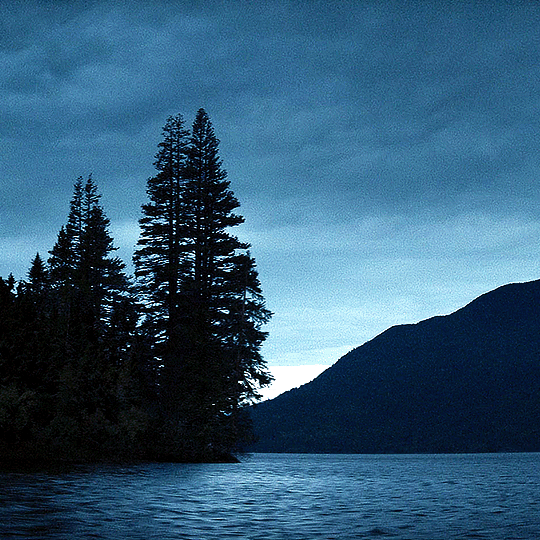
Just as the noh theatre in the show was a twisting of events within the show, so are all works of fiction that take inspiration from history. Some do it better than others. And on balance, in the show, Shōgun did it better than most. But so much of the marketing and the discussion of this adaptation has been on its accuracy. This has been by design - it was the strategy Disney adopted to market the show and give it a unique viewing proposition.
'This time, Shōgun is authentic!*
*an authentic Japanese period drama, but we won't mention that part.
And audiences have conflated that with what actually happened, as opposed to accuracy to a particular form of Japanese propaganda that has been honed over a century. This difference is crucial.
It doesn't detract from my enjoyment of it. Where I view James Clavell's novel as a horrid remnant of an orientalist, racist past, I believe the showrunners of 2024's Shōgun have updated that story to put Japanese characters front and centre, to decentralise the white protagonist to a more accurate place of observation and interest, and do their best to make a compelling subversion of the 'stranger in a strange land' tale.
But I don't want anyone who reads my words or has followed this series to think that the samurai were better than the armed thugs of any society. They weren't more noble, they weren't more honourable, they weren't more restrained. They just had 260 years in which they worked desk-jobs while wearing two swords to write stories about how glorious the good old days were, and how great people were.
Well... that's a bleak note to end on. Where to from here?
There are beautiful works of fiction that engage much closer with the actual truth of the samurai class that I'd recommend. One even stars Hiroyuki Sanada, and is (I think) his finest role.
I'd really encourage anyone who enjoyed Shōgun to check out The Twilight Samurai. That was the reality for the vast majority of post-Sekigahara samurai
For something closer to the period that Shogun is set, the best film is Seppuku (Hara-Kiri in English releases). It is a post-war Japanese film that engages both with the reality of samurai rule, and, through its central themes, how that created mythos was used to radicalise millions of Japanese into senseless death during the war. It is the best possible response to a romanticisation of a brutal, hateful period of history, dominated by cruel men who put power first, every single time.
I want to end this series, if I can, with hope. I hope that reading the novel or watching the 1980 show or the 2024 show has ignited in people an interest in Japanese culture, or society, or history. But don't let that be an end. Go further. There are so many things that aren't whitewashed warlords nobly killing - the social history of Japan is amazing, as is the women's history. A great book for getting an introduction to this is The Japanese: A History in 20 Lives.
And outside of that, there are so many beautiful Japanese movies and shows that don't deal with glorified violence and death. In fact, it makes up the vast majority of Japanese media! Who would have thought! Your Name was the first major work of art to bridge some of the cultural animosity between China and Japan stemming from WW2, and is a goofy time travel love story. Perfect Days is a beautiful movie about the simple joy of living, and it's about the most Tokyo story you can get.
Please go out, read more, watch more. If you can, try and find your way to Japan. It's one of the most beautiful places on earth. The people are kind, the food is delicious, and the culture is very welcoming to foreigners.
2024's Shōgun was great, but please don't let that be the end. Let it be the beginning, and I hope it serves as a gateway for you.
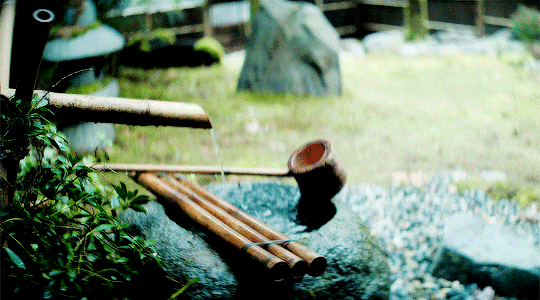
And I hope our little fandom on here remembers this show as a special time, where we came together to talk about something we loved. I'll miss you all.
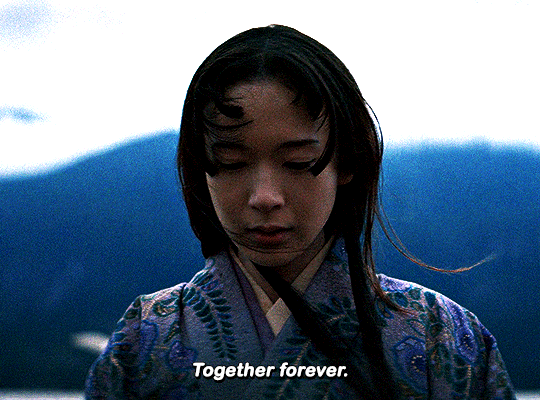
#couldn't agree more#what i took the “authenticity” to mean was mostly the costumes and language#it didn't occur to me anyone could think the show was actually faithful to historical persons and events#but looking back the marketing really didn't do much to dispel this potential misconception#oh and EVERYONE WATCH THE TWILIGHT SAMURAI#literally the best period piece i've ever seen
42 notes
·
View notes
Text
Me, pulling my hair up off my neck: Don’t think it, don’t think it...
Me, slipping the elastic off my wrist and onto my gathered hair: Seriously, don’t think it...
The voice of John Blackthorne in my head: YOU SIR ARE A SILLY LITTLE MAN AND YOUR HAIR LOOKS LIKE THE TAIL OF A PONY
47 notes
·
View notes
Text
I think that if there ever are more seasons of Shogun, there is a better chance of them actually being good than GoT.
D&D had only GRRT's writing to go on, meaning that whenever they had to diverge, they had nothing to lean on.
Shogun writers have the advantage in that Clavell did not create the world of Shogun. Even when they need to depict something that wasn't in the book, there is a whole real culture for them to set it in. Not to mention the real historical events they can follow.
Unlike with GoT, when they run out of book, the writers of Shogun won't be in the dark.
Not to mention they have already proven they can go off book and make it work. They made a lot of changes to the source material and none of them were for the worse (some were outright for the better).
What I'm trying to say is that the reason later seasons of GoT sucked is that everything that was good about the first seasons came from the books - the world, the storylines, the characters - came from GRRM, while in the case of Shogun, the source material is just one aspect of what made it great. What gets praised the most about the show is the cultural authenticity and the characters. The former just wasn't really present in the book and the latter went through some massive changes (Buntaro is straight up a different person in the show) and the changes worked.
I'm still worried about the future of Shogun, my honest opinion is that they should just let it be and move on to other projects, but IF more seasons do get made, I am carefully optimistic that they won't be a complete dumpster fire.
Shogun ends where the book ends. I'm fine with that. Even if the show continues with a new season, the quality of writing and dialogue won't be the same as the first season which is based on the book.
Just like Game of Thrones. The first few seasons were great and well written because they were based on the book writing. It went off the rails when it continues on its own without the book source.
17 notes
·
View notes
Text
Show-only fans will never understand just how much of a glow-up Toranaga went through from his description in the book to being played by these two
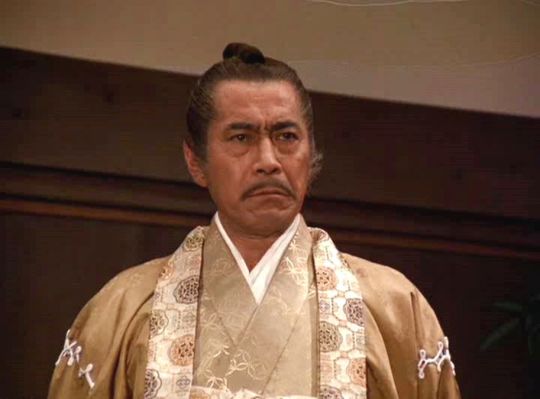
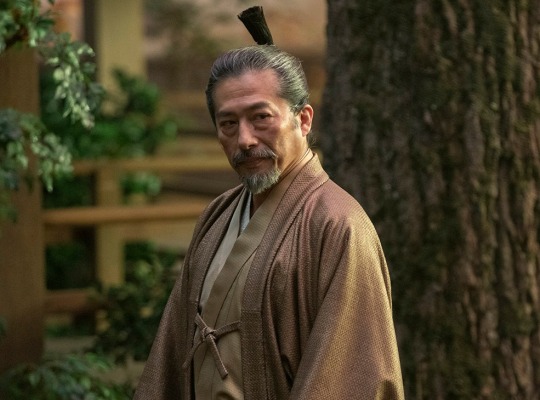
17 notes
·
View notes
Text
I genuinely think the showrunners intended for Ochiba to share this aspect of her book counterpart.
When I watched the show with my mother (who has never read the book), it took her like 5 minutes of watching Ochiba to go:
"Ohhh, so she hates Toranaga because she wanted to marry him instead of the Taiko, so she blames him for what she went through because he didn't marry her."
And I was like "Pfff no! Wait- unless ... yeah?"
So I think the hints were there, and Fumi Nikaido and Hiroyuki Sanada had them in mind during their scenes together.
The Ochiba and Toranaga situation is interesting and all, but it's also very funny spicy when you think about it. Their only interactions in the show are just Ochiba throwing bombastic side eyes and Toranaga being ".....???" like he's just confused wtf is her problem.
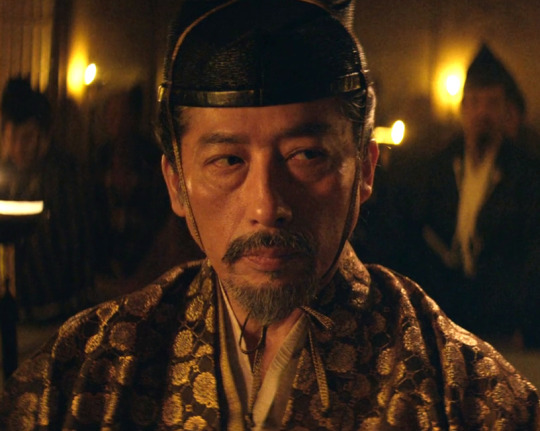
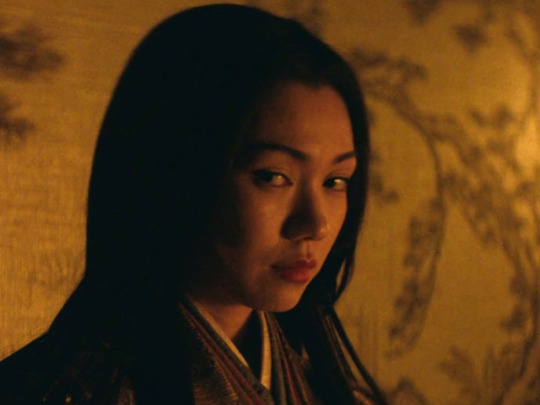
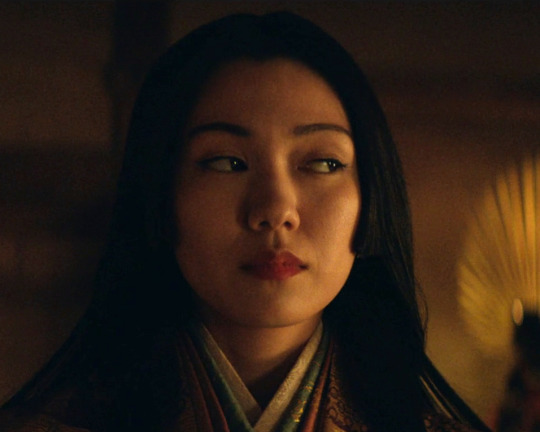
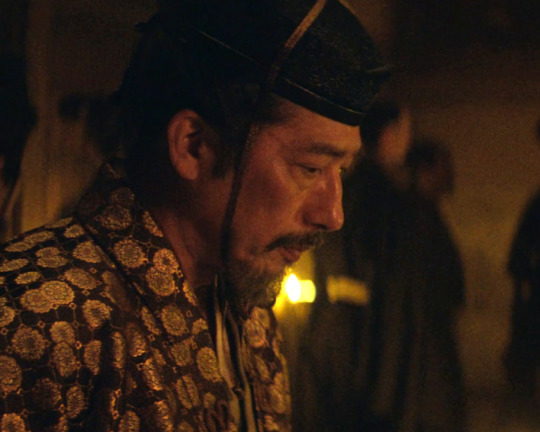
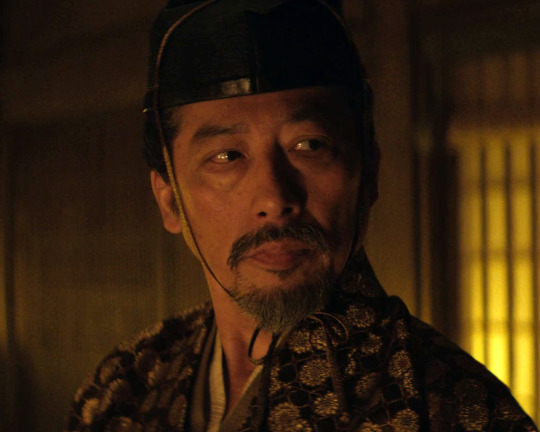
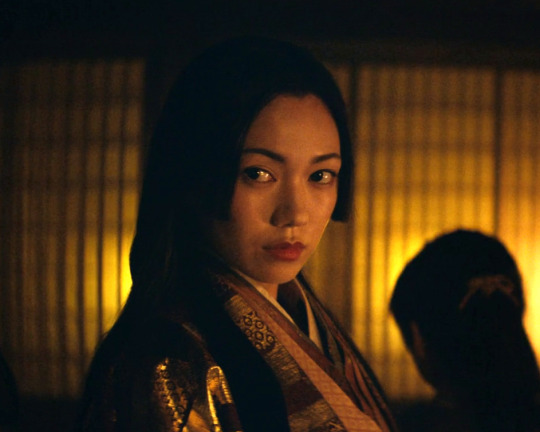
Just saying that the book lowkey ships them it was so funny, almost cursed even.
Chapter 56 (Ochiba's thoughts) -
"....Marry Toranaga? Buddha protect me from that shame, from having to welcome him and feel his weight and his spurting life.
Shame?
Ochiba, what is the truth? she asked herself. The truth is that you wanted him once—before the Taikō, neh? Even during, neh? Many times in your secret heart. Neh? The Wise One was right again about pride being your enemy and about needing a man, a husband."
Chapter 58 -
"...Suddenly Ochiba wished that Toranaga was here beside her and not Ishido, that Toranaga was master of Osaka Castle and master of the Taikō’s treasure, Protector of the Heir and Chief General of the Armies of the West, and not Ishido. Then there would be no problems. Together they would possess the realm, all of it, and now, today, at this moment, she would beckon him to bed or to an inviting glade and tomorrow or the next day they would marry, and whatever happened in the future, today she would possess and be possessed and be at peace."
Chapter 56, (after she secretly had sex with that peasant who resembles the Taiko) -
Then, just the other side of the wood, Toranaga had been waiting for her. Had he seen her, she wondered in panic.
“I was worried about you, Lady,” he had said.
“I’m—I’m perfectly all right, thank you.”
“But your kimono’s all torn—there’s bracken down your back and in your hair….”
“My horse threw me—it’s nothing.” Then she had challenged him to a race home to prove that nothing was wrong, and had set off like the wild wind,
There were other lines of Ochiba having h0rny thoughts and it's just-💀💀💀
In Ochiba's POV, she did considered reasonable alliance with Toranaga. Overall, her reaction to being suggested into marrying Toranaga was like ,"Fuck no... unless?"
Meanwhile, Toranaga's reaction to the suggestion was straight up "what the fUCK-".
51 notes
·
View notes
Text
After the finale, many seems to conclude that Toranaga's schemes has always been perfect from the start, that every events and every deaths are all part of his design all along, happening exactly how he wants it. But really it was only half true. His "sacrifices" aren't intentional sacrifices. No matter how clean he plotted, unexpected blunders always occurred beyond his control, he just happens to be very good at letting it flow rather than going against the current.
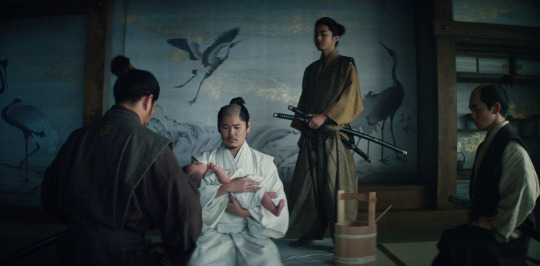
Tadayoshi and Tsurumaru, Fuji's husband and son. Toranaga never even intended them to die. Before he came to Osaka, he took Ochiba to Edo because her sister was in labour, knowing the regents wouldn't dare to do anything to him while the heir's mother is still in his domain. Everything would've gone all calm and well until at least Ochiba came back and the council voted. But Tadayoshi unexpectedly lashed out publicly with half-drawn katana in front of the regents (in Tadayoshi's defense: he does it out of loyalty for Toranaga), such offense would've sentenced Toranaga and his entire clan to die had he didn't de-escalate the situation. Tadayoshi then asked for seppuku and to end his bloodline out of shame for his outburst. Hiromatsu said he was foolish for it, but Toranaga acknowledged Tadayoshi's bravery, and ensured Fuji be spared from it.
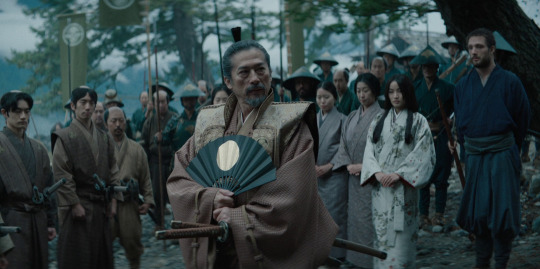
The show didn't quite picture it, but in the book Toranaga was actually quite shocked to found that Yabushige had assembled a sizable army when he arrived in Ajiro, large enough to end him had Yabushige wanted to betray him right there. However, he kept a calm facade and maxed out charisma points to sway Yabu's army into loyalty, right out of Yabu's hands, acting as the true interest of the late Taiko.
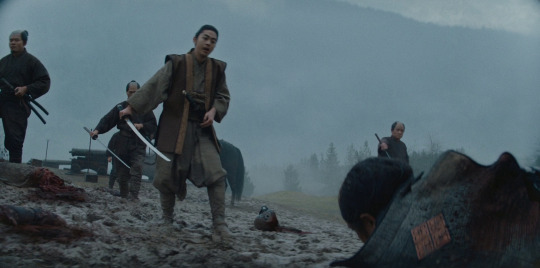
Toranaga never intended to draw the first blood with the killing of Jozen. Nagakado was honestly to blame for this, even Omi too for provoking it. But then it turned out to be a W move for him, because in response the entire Osaka would be out for blood for his head into the open field . No matter how strong Toranaga's army is, attacking five armies inside a fully armed fortress would be a foolish instant defeat.
Then Nagakado acted out of place once again. So many had said that Toranaga "sacrificed" his son, when actually this boy is one rabid horse and Toranaga was right to pull his reins. If everyone is somewhat a "pawn" for Toranaga to use, he didn't actually count Nagakado as one. He always tried to keep Nagakado away from the big fight, if not out of love then at least out of wisdom for his son's recklessness. When Saeki handed the order for Nagakado to commit seppuku over the crime of killing Jozen, Toranaga sternly prevented it. Remember that he could've just let Nagakado took it like Tadayoshi did, it would've been a fair retribution and de-escalate the hostility, but still he didn't.
In Nagakado's defense, how would you feel being the son of a great lord famous for astounding achievement at such a young age, and then you, the no swag son. Even if Toranaga didn't expect Nagakado to copy him, the people around them would still constantly compare them. That's why Nagakado was so rogue to prove himself. It was exactly the same with Saeki, so jealous of Toranaga that when the opportunity arise to thwart his brother he took it.
Toranaga was fully prepared for the real Crimson Sky until the earthquake devastated his army, not to mention the unexpected betrayal from his brother. He had no choice but to surrender.
Nagakado's death was the most unnecessary, truly no beauty in it. He was the one blunder that kept blundering himself out of his father's control. But then turns out the mourning period for Nagakado was crucial for Toranaga to plan the next move. Without it, the council would've immediately ordered him and his clan's execution and it would be all for nothing. In the end, he made his son's ugly death into a meaningful one.
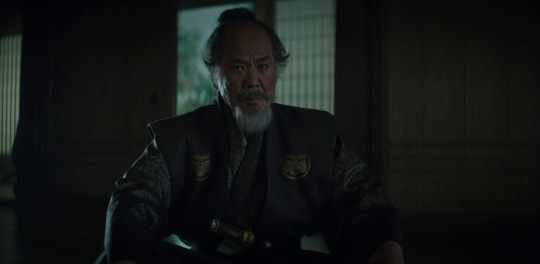
Then came Hiromatsu's death, the most costly death for Toranaga. Being friends for so long they understood the cost of the greater goal. Yes Nagakado's death did buy him some time, but the council wouldn't be so convinced of his surrender, the master of trickery™. Plus they took Nagakado's death as a bare minimum L. "Don't give up on our lord, even when it appears he has given up on himself." Hiromatsu knew that they have come so far and they couldn't stop now, so out goes Toranaga's best guy to complete the surrender facade.
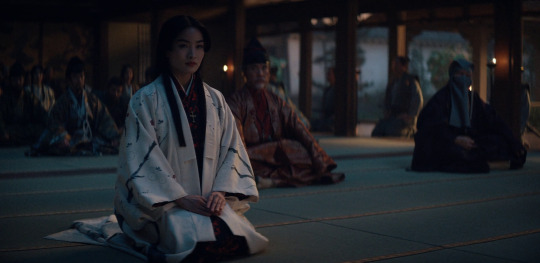
The secret ultimate ace card was Mariko. From the beginning, no one seemed to fully catch up with Toranaga, not even Hiromatsu, except for Mariko. The relationship between Toranaga and Mariko was a mutual one, each with their own goals but happens to be intertwined in the same path.
Toranaga didn't even intend for Mariko to die. The book explained that Toranaga had future plans for Mariko after the war, to divorce her from Buntaro and have her as his messenger to England with John. He knows that Mariko was the only one who could reach Ochiba. He just wanted Mariko to come get Kiri, Shizu, and their newborn son to get out of Osaka, at the same time tell Ishido he's a bitch and hopefuly broke Ishido and Ochiba's alliance (the Minowara sends their regards). It was ONE BIRD throwing TWO STONES. Unfortunately, then he lost his ace card too but damn did it worked a little too well, he literally won the war because of it.
People expected John to be Toranaga's secret weapon, setting the expectation of a "Some dude got isekai-ed into foreign world and now he's destined to save it" trope.
To borrow Mon Mothma's quote: "I show you the John in my hand, you miss the Mariko at your throat".
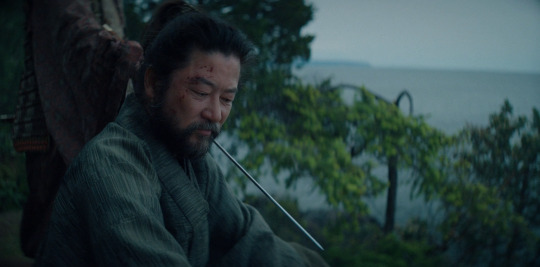
Yabushige was the audience's voice when he asked "How does it feel to shape the wind to your will?" Because everyone saw Toranaga's final reveal and thought damn it was him all along! But then Toranaga went meta and replied, "I don't control the wind, I only study it." No, everything didn't fell into place like exactly how he wanted. He's not the all-knowing untouchable god. Many times he was crossed and blocked, but instead of trying to force his path through, he simply let it flow. His schemes are not a rigid linear one like how his opponents worked, but it branches and found its own way, and that's how he won.
45 notes
·
View notes
Text
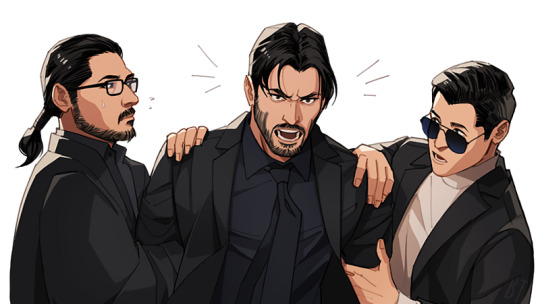
Several years back
1K notes
·
View notes
Text
Glad to see Hiro-san continuing the proud tradition of being a better father figure to his co-stars than his characters ever were to their children.
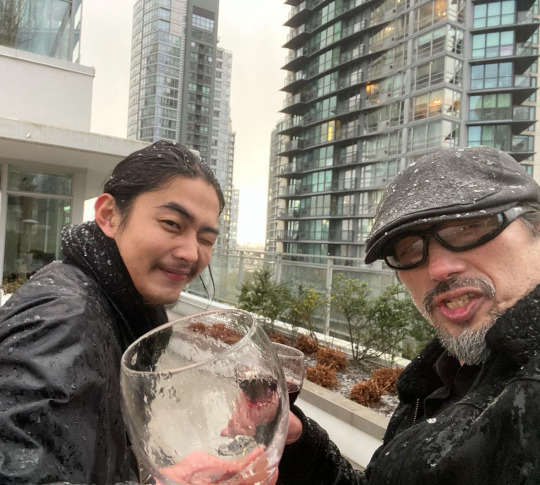
Absolutely SCREAMING at this picture of Yuki Kura and Hiroyuki Sanada 😭❤️ via Yuka’s instagram @kura__yuki
52 notes
·
View notes
Text
picture this, i give you a glass bottle and tell you to open it, but bottle openers are forbidden, how do you do it?
94K notes
·
View notes
Text
Picket Force Six under command of Admiral Ar'alani
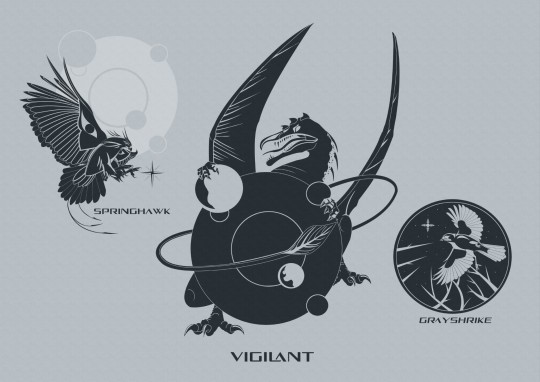
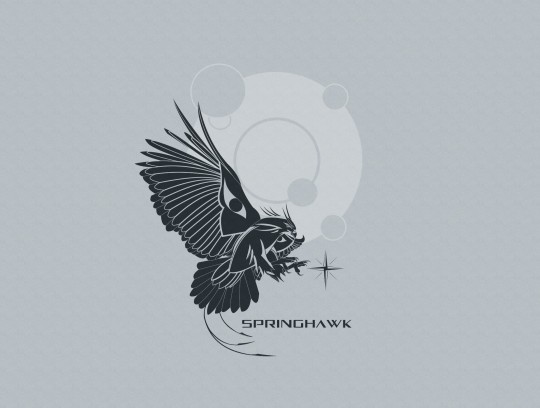
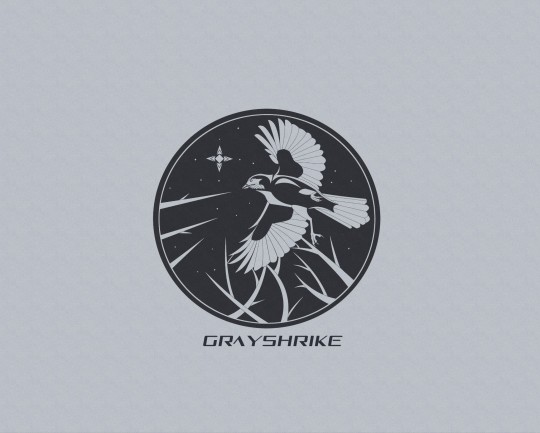
Creating logos for Chiss Expansionary Defense Fleet Ships. Springhawk and Grayshrike are now joining Vigilant.
186 notes
·
View notes
